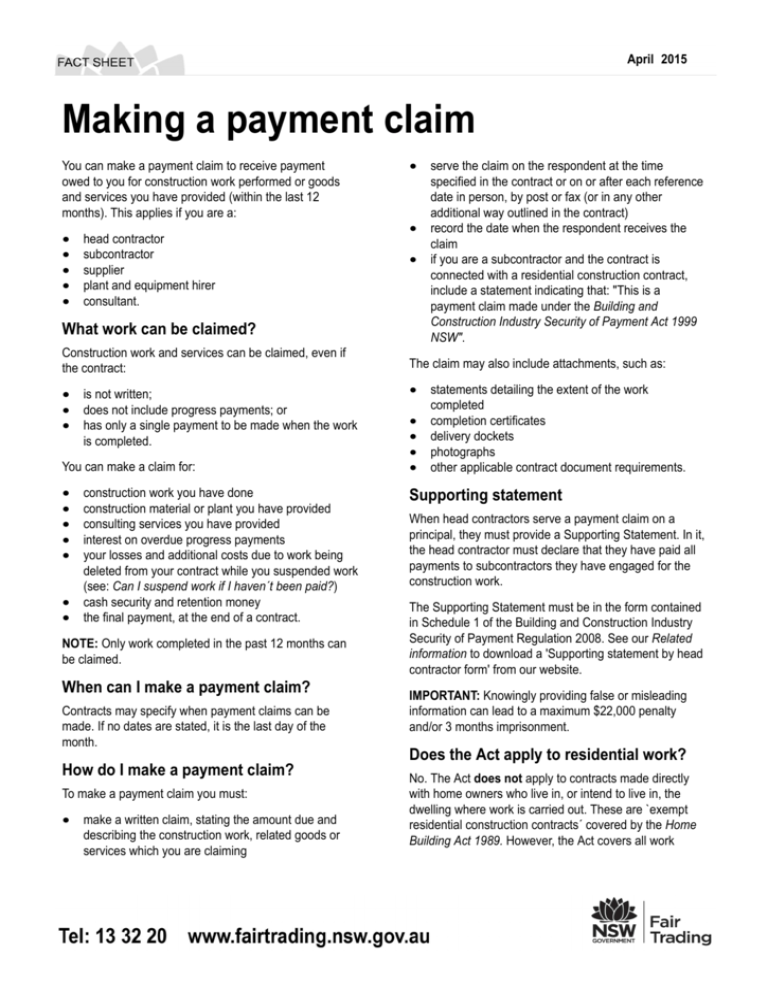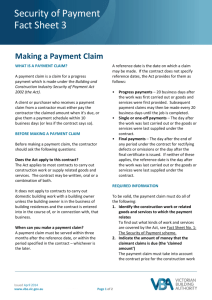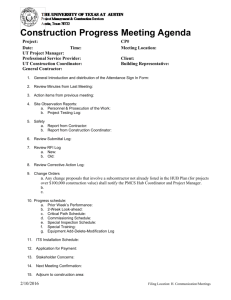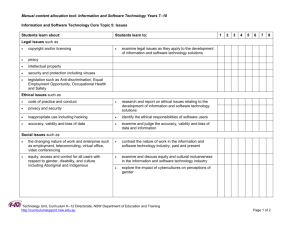Making a payment claim
advertisement

April 2015 Making a payment claim You can make a payment claim to receive payment owed to you for construction work performed or goods and services you have provided (within the last 12 months). This applies if you are a: ● ● ● ● ● head contractor subcontractor supplier plant and equipment hirer consultant. What work can be claimed? Construction work and services can be claimed, even if the contract: ● ● ● is not written; does not include progress payments; or has only a single payment to be made when the work is completed. You can make a claim for: construction work you have done construction material or plant you have provided consulting services you have provided interest on overdue progress payments your losses and additional costs due to work being deleted from your contract while you suspended work (see: Can I suspend work if I haven´t been paid?) ● cash security and retention money ● the final payment, at the end of a contract. ● ● ● ● ● NOTE: Only work completed in the past 12 months can be claimed. When can I make a payment claim? Contracts may specify when payment claims can be made. If no dates are stated, it is the last day of the month. How do I make a payment claim? To make a payment claim you must: ● make a written claim, stating the amount due and describing the construction work, related goods or services which you are claiming serve the claim on the respondent at the time specified in the contract or on or after each reference date in person, by post or fax (or in any other additional way outlined in the contract) ● record the date when the respondent receives the claim ● if you are a subcontractor and the contract is connected with a residential construction contract, include a statement indicating that: "This is a payment claim made under the Building and Construction Industry Security of Payment Act 1999 NSW". ● The claim may also include attachments, such as: ● ● ● ● ● statements detailing the extent of the work completed completion certificates delivery dockets photographs other applicable contract document requirements. Supporting statement When head contractors serve a payment claim on a principal, they must provide a Supporting Statement. In it, the head contractor must declare that they have paid all payments to subcontractors they have engaged for the construction work. The Supporting Statement must be in the form contained in Schedule 1 of the Building and Construction Industry Security of Payment Regulation 2008. See our Related information to download a 'Supporting statement by head contractor form' from our website. IMPORTANT: Knowingly providing false or misleading information can lead to a maximum $22,000 penalty and/or 3 months imprisonment. Does the Act apply to residential work? No. The Act does not apply to contracts made directly with home owners who live in, or intend to live in, the dwelling where work is carried out. These are `exempt residential construction contracts´ covered by the Home Building Act 1989. However, the Act covers all work April 2015 where the home owner engages a head contractor, who then subcontracts out that work. This includes all work, materials and plant supplied by subcontractors, consultants and suppliers. For example, if a home owner engages a head contractor, who then subcontracts part of that work to a plumber, the plumber can make a progress payment claim to the head contractor. The Act also applies to residential work involving investment properties, landlords, strata scheme owners corporations, developers, builders, contractors, subcontractors, consultants and suppliers. Can I resubmit a claim? Only one claim can be made for each reference date. This is the date stated in the contract for making claims. If there is none, it is the last day of each month. If money has not been paid for a previous claim, this can be included in the next claim. When should I receive payment? willing to pay and the reasons for not paying any part of your claim). If they don't serve you with one in that timeframe, they must pay the whole claim. What if I get no response? You can take court action or apply for adjudication to recover money due to you if: you have not received a payment schedule from the respondent within 10 business days after making a claim, and ● they do not pay you by the due date. ● To use adjudication, once the due date has passed, you have 20 business days from that date to notify the respondent of your intention to apply for adjudication. If you still have not been paid or received a payment schedule 5 business days after giving that notice, you can lodge an application for adjudication to an Authorised Nominating Authority (ANA). This depends on who makes the payment claim. Unless stated in the contract, the due date for payment is: What if I disagree with a payment schedule? 15 business days after the claim is made for a head contractor, claiming from the principal ● 30 business days after the claim is made for a subcontractor (excluding residential work) ● 10 business days after the claim is made for a subcontractor, doing residential work. You may apply for adjudication within 10 business days of receiving the schedule. ● A contract may specify earlier payment due dates than those stated above, but not later. If you are not paid by the due date, you have a right to claim interest at the rate specified in the contract (if any) or at the rate set by Rule 36.7 of the Uniform Civil Procedure Rules 2005, whichever is greater. The current rate is published on the NSW Local Court website. How long do I have to wait for a response? If the respondent is not willing to pay all the money claimed, they have a maximum of 10 business days after you have submitted your claim to give you a payment schedule (a written statement of the amount they are I agree with the payment schedule but haven't been paid. What now? If you have not been paid by the due date, you may apply for adjudication within 20 business days of the due date. Can I suspend work if I haven’t been paid? If you have not been paid by the due date, you can serve on the respondent a written notice of your intention to suspend work. This notice must state that you are giving the notice under the Act. You may then suspend work 2 business days after the notice has been given. The respondent cannot claim any damages against you for suspending work. You may claim any loss you suffer as a result of the respondent removing work from your contract because of your suspension of work. Your right to suspend work continues until the end of 3 business days from when you have been paid by the respondent. April 2015 www.fairtrading.nsw.gov.au Fair Trading enquiries 13 32 20 TTY 1300 723 404 Language assistance 13 14 50 This fact sheet must not be relied on as legal advice. For more information about this topic, refer to the appropriate legislation. © State of New South Wales through NSW Fair Trading You may freely copy, distribute, display or download this information with some important restrictions. See NSW Fair Trading's copyright policy at www.fairtrading.nsw.gov.au or email publications@finance.nsw.gov.au








